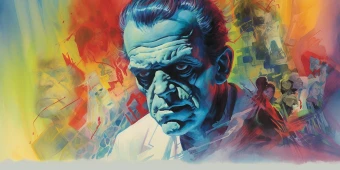by Franz Kafka


The Metamorphosis: Themes
Table of contents
- Isolation
- Identity
- Transformation
- Family
The Metamorphosis by Franz Kafka is a rich and multi-layered work that offers insights into the human condition and the complexities of human relationships. The main themes in The Metamorphosis are isolation, identity, transformation, and family.
The theme of isolation is central to the story, as the protagonist Gregor Samsa wakes up one day to find himself transformed into a monstrous insect. This physical transformation leads to his emotional and social isolation from his family and society, as they struggle to come to terms with his new form. Gregor's isolation highlights the human need for connection and the devastating consequences of being cut off from others.
Identity is another key theme of "The Metamorphosis". Gregor's transformation raises questions about the nature of identity and the extent to which it is shaped by external factors such as appearance, social status, and occupation. As Gregor struggles to come to terms with his new form, he must also grapple with his sense of self and his place in the world.
Transformation is another major theme in the novella, as Gregor's physical transformation serves as a metaphor for the emotional and psychological transformations experienced by the other characters. Through the lens of Gregor's transformation, Kafka explores the human capacity for change and adaptation.
Finally, family is a central theme in "The Metamorphosis". The story highlights the complexities of familial relationships and the ways in which they can be strained by conflict, misunderstanding, and isolation. Kafka also raises questions about the responsibilities and obligations that family members owe to each other, and the challenges that arise when these obligations are not met.
 Isolation
Isolation
 Identity
Identity
 Transformation
Transformation
 Family
Family
Isolation

Isolation is a central theme in Franz Kafka’s The Metamorphosis, as the protagonist Gregor Samsa finds himself transformed into a giant insect and increasingly alienated from his family and society. This sense of isolation is reinforced throughout the novella by various literary devices, such as imagery, symbolism, and foreshadowing.
The physical transformation of Gregor into a giant insect symbolizes his emotional and psychological isolation from his family, who are unable to communicate with him or understand his needs. Gregor’s inability to speak, coupled with his new form, makes him feel trapped and imprisoned within his own body. This sense of confinement is emphasized by the claustrophobic setting of the Samsa family’s apartment, where Gregor’s room is described as a “cell.”
The theme of isolation is also reinforced by the reactions of Gregor’s family, who initially attempt to care for him but soon grow tired of his presence and neglect him. His father becomes increasingly aggressive and violent towards him, while his mother and sister Grete begin to avoid him altogether. The family’s rejection of Gregor highlights the loneliness that comes with being different or ostracized, as well as the emotional distance that can arise between family members.
Moreover, the theme of isolation is not limited to Gregor’s physical transformation and the Samsa family’s reaction to it. The novella also explores the idea of social isolation, as Gregor’s condition becomes known to his employers and the boarders living in the Samsa family’s apartment. The boarders, in particular, are depicted as cruel and dismissive towards Gregor, further highlighting the isolation he experiences from society as a whole.
Through Gregor’s experience, Kafka presents a powerful commentary on the human condition, exploring the ways in which individuals can become trapped and isolated in their own bodies and minds, as well as the ways in which societal norms and prejudices can lead to further isolation and alienation. In this sense, The Metamorphosis can be seen as a cautionary tale, warning readers of the dangers of isolation and urging them to strive for empathy and understanding towards those who may be different or marginalized.
Identity

The theme of identity is one of the central themes in Franz Kafka’s novella, The Metamorphosis. The story is an exploration of how an individual’s sense of self is affected when their outward appearance and behavior drastically change. The protagonist, Gregor Samsa, wakes up one morning to find himself transformed into a giant insect-like creature, which leads to a profound change in his identity and the way others perceive him.
Throughout the novella, Gregor struggles to come to terms with his new identity as an insect, while his family and society reject and isolate him. Gregor’s transformation represents a physical manifestation of his inner turmoil and the alienation he feels from the world around him. He is no longer the provider for his family and is unable to communicate with them. He feels trapped and unable to escape his current situation.
The theme of identity is further explored through the reactions of Gregor’s family members. They struggle to accept his new form and are unable to see past his physical appearance. This rejection ultimately leads to Gregor’s isolation and death. In this sense, Kafka highlights the importance of acceptance and understanding in the formation and maintenance of one’s identity.
Furthermore, the theme of identity is also evident in the relationship between Gregor and his job. Gregor’s job as a traveling salesman is an important part of his identity, and his inability to continue working leads to a loss of purpose and direction in his life. His family’s dependence on him and his job also highlights the impact that one’s identity can have on others.
Kafka’s exploration of the theme of identity in The Metamorphosis also touches on the idea of conformity and societal expectations. Gregor’s transformation is a symbol of his inability to conform to the expectations and norms of society. His transformation is seen as a threat to the established order, and he is subsequently ostracized and rejected.
In conclusion, Kafka’s The Metamorphosis is a powerful exploration of the theme of identity. Through Gregor’s transformation and subsequent rejection by society, Kafka highlights the importance of acceptance and understanding in the formation and maintenance of one’s identity. The novella also touches on the impact that one’s identity can have on others and the role of conformity and societal expectations in shaping one’s sense of self.
Transformation

The theme of transformation is central to Franz Kafka’s novella, The Metamorphosis. The story’s protagonist, Gregor Samsa, undergoes a literal physical transformation from a human into a giant insect, which triggers a series of transformations in his relationships with his family and his own sense of self.
One interpretation of the theme of transformation in The Metamorphosis is that it represents the alienation and estrangement experienced by many people in modern society. Gregor’s transformation isolates him from his family and the outside world, as he is unable to communicate effectively and is viewed with fear and disgust by those around him. This is symbolic of the way in which modern society can leave people feeling disconnected and alone, unable to find a place where they belong.
Another interpretation of the theme of transformation is that it represents the loss of control over one’s own life. Gregor’s transformation happens without warning and without any apparent cause, leaving him helpless to stop it or reverse it. This can be seen as a metaphor for the way in which life can sometimes take unexpected turns, leaving people feeling powerless to control their own destinies.
The theme of transformation is also linked to the idea of metamorphosis in nature, particularly in the way that insects undergo a series of transformations as they mature. This can be seen as a metaphor for the way in which people change and grow throughout their lives, often undergoing significant transformations in their personality, beliefs, and values.
Another aspect of the theme of transformation in The Metamorphosis is the way in which it challenges traditional notions of identity. Gregor’s transformation raises questions about what it means to be human, and whether his insect form is still capable of possessing qualities such as consciousness and empathy. This is reflected in the way that his family initially struggles to come to terms with his transformation, as they are unsure whether he is still the same person they knew before.
Ultimately, the theme of transformation in The Metamorphosis highlights the fragility of human existence and the way in which our sense of self can be called into question at any moment. Through Gregor’s transformation, Kafka explores the complex nature of human identity and the challenges that can arise when this identity is threatened or disrupted.
Family

In Franz Kafka’s “The Metamorphosis,” family is a central theme that highlights the complex dynamics and relationships between family members. Through the transformation of Gregor Samsa, the story explores how the family’s dynamic shifts and changes in response to unexpected circumstances.
At the beginning of the story, the Samsa family appears to be a typical middle-class family, with Gregor as the sole breadwinner, his parents, and his sister Grete. However, Gregor’s transformation into a giant insect disrupts the family’s routine and brings to light the hidden tensions and resentments within the family. As Gregor becomes increasingly isolated and disconnected from his family, they struggle to come to terms with his transformation and the burden it places on their lives.
One way that the theme of family is explored in the story is through the shifting power dynamics within the family. Prior to Gregor’s transformation, he is the one who provides for the family and takes care of their financial needs. However, after his transformation, he becomes a burden on the family and is treated as an outcast. His father, who had previously been weak and dependent on Gregor, takes on a more dominant role in the family and becomes the primary breadwinner. This change in power dynamics causes tension and conflict between the family members, as they struggle to adjust to their new roles and responsibilities.
Another way that the theme of family is explored is through the breakdown of communication and empathy between family members. As Gregor becomes more insect-like and less human, his family members struggle to relate to him and communicate with him effectively. They view him as a monster rather than a family member, and their fear and disgust prevent them from seeing his humanity. Similarly, Gregor struggles to communicate with his family, as he is unable to speak and express himself in a way that they can understand. This breakdown in communication leads to a sense of isolation and loneliness for both Gregor and his family members.
Finally, the theme of family is also explored through the sacrifices and responsibilities that family members take on for one another. Despite the tension and conflict between them, the Samsa family members ultimately remain loyal to one another and make sacrifices to help each other. Grete, in particular, takes on the responsibility of caring for Gregor and attempts to help him in his insect form. However, her efforts are ultimately futile, and she becomes increasingly frustrated and resentful towards him. In the end, the family decides that it is best for them to move on without Gregor, and they dispose of his body without any mourning or ceremony.
In conclusion, the theme of family is a complex and nuanced one in “The Metamorphosis.” Through the transformation of Gregor Samsa, the story explores the shifting power dynamics, breakdown of communication, and sacrifices that occur within a family. Ultimately, the story highlights the fragility and complexity of familial relationships and the ways in which unexpected circumstances can impact these relationships.

- Instructions Followed To The Letter
- Deadlines Met At Every Stage
- Unique And Plagiarism Free


 The Yellow Wallpaper
The Yellow Wallpaper
 The Things They Carried
The Things They Carried
 Frankenstein
Frankenstein